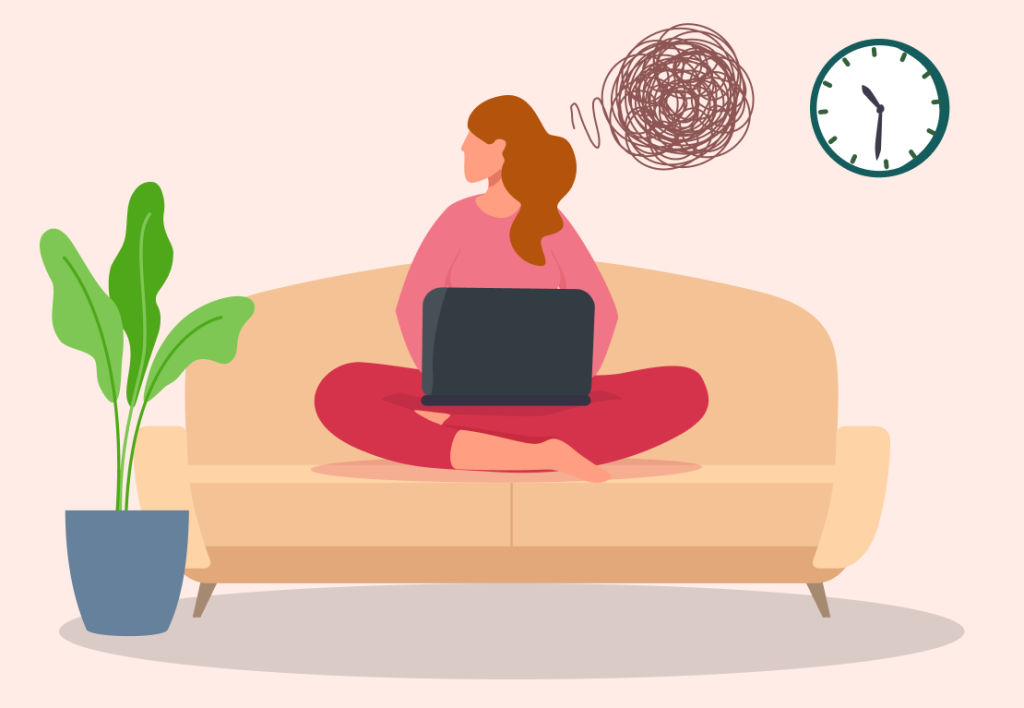The biggest challenges of remote working – and how to overcome them

In recent years, remote working has taken the modern workplace by storm, bringing new challenges and dynamics. With about 1/5 of all the workforce now working remotely to some degree, and with an overwhelming 98% expressing a preference for working remotely at least some of the time, it is clear that the question of remote work is on almost any organization’s agenda.
Want to get the most out of your time?
Try DeskTime for free!
Try free for 14 days · No credit card required.
By signing up, you agree to our terms and privacy policy.

Remote working has the potential to benefit both workers and employers – organizations can save money by requiring less office space, while employees enjoy greater flexibility, comfort, and the elimination of daily commutes. However, remote working doesn’t come without drawbacks and presents its own distinct challenges such as productivity, communication, and work-life balance concerns. The good news is that with a thoughtful approach and the right tools, these challenges can be overcome. Look no further – we will explain how to do it in this blog post.
Communication – and how to make it work in a remote setting
A major challenge of working remotely is being physically separated from colleagues. This makes it harder to build strong working relationships because it’s more difficult to connect with people when you don’t see them face-to-face.
In an office, casual interactions like grabbing coffee or sharing lunch can foster stronger personal relationships, leading to better collaboration. It’s certainly harder to be part of the company culture when you work from home. Remote workers can feel more disconnected from their company and may even feel they are missing out on a chance to advance their career. However, these issues can be mitigated through effective remote communication strategies.

Use collaborative platforms
Collaborative software platforms, such as Slack and Microsoft Teams, create a virtual office environment where team members can connect and communicate seamlessly, regardless of their physical location. With features such as real-time messaging, video conferencing, and screen sharing, these platforms provide a centralized space for interaction and collaboration.
Focused meetings
Meetings are crucial for decision-making, getting everyone on the same page, and sharing updates. Remote work can create the impression that more virtual meetings are necessary to compensate for a lack of in-person interactions, but managers should avoid this mistake. A better approach is to schedule meetings strategically, always focusing on clear goals. This helps avoid unnecessary meetings and makes the most of everyone’s time.
Virtual social interactions
In the absence of in-person interactions, it’s a good idea to encourage virtual social interactions. These are essential for team building and fostering company culture within remote teams. Creating virtual spaces for casual conversations, shared experiences, and team-building activities helps build a strong sense of community and belonging. This could include anything from virtual quizzes to a dedicated Slack channel for funny pictures or a monthly book or movie club.
Work/life balance and well-being – these cannot be ignored
When working remotely, it can be difficult to disconnect and recharge. The lines between work and personal life can become blurry, leading to stress, exhaustion, and feelings of isolation. The absence of a structured work environment can also make it harder to establish a consistent routine, which can have a negative impact on mental health and productivity. Both employees and employers should be aware of these potential problems – the good news is that there are ways to address them.

Pro tips for better work/life balance and mental well-being
- Establish clear boundaries: As an employee, create a clear division between work and personal life. When your workday ends, treat it like leaving a physical office. Avoid checking emails or engaging in work-related tasks after hours. Give yourself the time to disconnect and recharge.
- Follow a schedule: Maintain regular work hours, including breaks and a proper lunch away from your work desk. Despite the more flexible nature of remote working, most people will still benefit from a more structured approach. Knowing when your workday starts and finishes is better than a haphazard approach of working whenever you feel like it.
- Active and open communication: As an employee, don’t hesitate to discuss your workload and any issues you’re facing with remote work with your team and manager. Don’t think that working from home means you have to deal with problems on your own.
If you are a manager, take extra care to check how your team is doing. You might have to be more inquisitive to learn about things that would be obvious in in-person settings, such as someone struggling mentally, for example.

Be smart about your time!
Use DeskTime for time management, and always stay on top of your team’s efficiency ratings.
Productivity – how to maximize it for remote teams
One of the most frequently expressed concerns about remote work is the potential impact on productivity. The traditional office environment, with its bustling atmosphere and face-to-face interactions, has often been associated with increased productivity. There has been skepticism about whether employees can maintain the same level of output while working from home, especially without the direct supervision typically found in office settings. However, with the right strategies and tools, there is no reason to believe that remote work can’t be equally productive.
Set up a home office
The idea of working from home is sometimes associated with laptops on kitchen tables and conference calls with participants sitting on living room couches. While this kind of casual setup might work in the short term, establishing a dedicated home office (or at least a workspace) is essential for focused and productive remote work.
A home office provides a structured environment that mimics the traditional workplace. It allows for better organization, reduces distractions, and helps maintain a professional atmosphere. To this end, organizations should ensure that remote workers have all the necessary tools they would have in a traditional workplace, such as laptops, monitors, furniture, and various accessories.
Use project management tools
Project management tools are essential for remote teams to stay organized and on track. For employees, it’s not uncommon to juggle multiple tasks and projects throughout the day. Managing all of this is crucial for effective workflow, especially for remote teams with diverse schedules and work styles.
Project management platforms provide a centralized hub for planning, tracking, and collaborating on projects. With features like task assignment, deadlines, and progress tracking, remote teams can work together more efficiently. For example, DeskTime offers a dedicated project tracking feature that makes the job of handling numerous projects at once much easier.

Take advantage of productivity software
Productivity software offers a valuable toolset for both workers and employers to navigate the challenges of remote work. By tracking time spent on different tasks, remote employees can gain insights into their productivity patterns, helping them identify time-wasting activities and optimize their workflow. It also provides concrete evidence of hours worked, which can be especially useful for freelance or contract workers.
On the employer side, productivity software offers data insights for measuring team performance and efficiency. Managers can identify bottlenecks, and make better informed decisions about resource allocation. Managers can also determine which employees are doing well in a remote setting and who might need a bit more support to perform well.
DeskTime can handle all of this and more, making it a prime choice for tackling challenges associated with remote work. Try the demo and see for yourself.
Master the challenges of remote working
Having gone through the trial of forced remote work during the Covid pandemic, followed by a full or partial return to the office for some, we can now say that the dust has settled. Both sides of the equation – workers and employers – have experienced the pros and cons of this work model.
While some organizations may still be skeptical, and certain jobs may not be suitable for remote work, overall, the rise of remote work is here to stay. And it’s safe to say that with the right approach to communication, a suitable home workspace, and productivity software, remote work can be just as effective as the traditional office approach.
Did you find this article useful? Give it a clap!
Psst! You can clap more than once if you really loved it 🙂